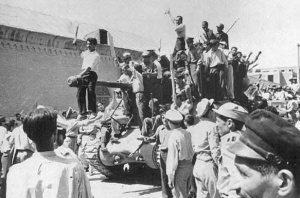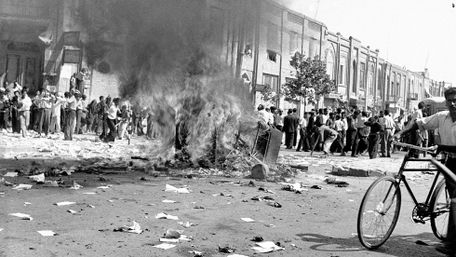Difference between revisions of "Iran/1953 coup d'état"
(better desc) |
|||
| Line 6: | Line 6: | ||
|wikipedia=https://en.wikipedia.org/wiki/1953_Iranian_coup_d'état | |wikipedia=https://en.wikipedia.org/wiki/1953_Iranian_coup_d'état | ||
|locations=Iran | |locations=Iran | ||
| − | |description=The first large scale regime change carried out by the CIA. | + | |description=The first large scale regime change carried out by the CIA, at the behest of [[big oil]]. In 2000, the [[US state department]] changed its {{on}} by finally admitting responsibility. |
|perpetrators=CIA, MI6, Seven Sisters | |perpetrators=CIA, MI6, Seven Sisters | ||
|fatalities=500 | |fatalities=500 | ||
Revision as of 04:06, 22 October 2018
 | |
| Date | 15 August 1953 - 19 August 1953 |
|---|---|
| Location | Iran |
| Perpetrators | CIA, MI6, Seven Sisters |
| Deaths | 500 |
| Interest of | Norman Darbyshire, Charlotte Denett, Ann Lambton, Monty Woodhouse |
| Description | The first large scale regime change carried out by the CIA, at the behest of big oil. In 2000, the US state department changed its official narrative by finally admitting responsibility. |
Operation Ajax, headed by Kermit Roosevelt was the CIA's first large scale regime change operation - the first of many. It was initiated by the 1951 announcement of Mohammad Mosaddegh that he intended to cut the Seven Sisters oil profits by nationalising their operations in Iran.[1] It was approved by President Eisenhower on July 22, 1953.[2]

Official narrative
For almost 50 years the official narrative was that MI6 and the CIA had nothing to do with the coup, which changed in 2000 when the US Secretary of State Madeleine Albright openly referred to the US role in the coup.[Where?] After 60 years, the CIA released documents which admitted that "The military coup... was carried out under CIA direction as an act of US foreign policy".[4] It would be more correct to admit that it was "covertly organised by MI6 and the CIA"[5]. Averell Harriman went to Iran to negotiate an Anglo-Iranian compromise, asking the Shah's help; his reply was that "in the face of public opinion, there was no way he could say a word against nationalisation".
Problems
The coup's trigger is generally agreed to have been the nationalisation of the oil industry announced by Mohammad Mosaddegh in 1951. Charlotte Dennett notes that the coup was planned since this date and so the role of the Seven Sisters should not be underestimated.[6] As with the ensuing 1954 Guatemalan coup d'état, US "national security" appears to have overlapped very largely with the private commercial interest of the rich elite who were in a position to command the CIA. To see the coup as organised by MI6 or the CIA is therefore probably a mistake.
Related Quotations
| Page | Quote | Author | Date |
|---|---|---|---|
| 1951 | “The oil cartel or deep state initiated in 1951 a process [to remove Mossadeq from power] that the American public state only authorised [through the CIA] two years later” | Peter Dale Scott | 2015 |
| Bilderberg/1954 | “Americans saw that firm Western action in Persia, Berlin, and Korea had produced successful results and they therefore believed in continuing a firm policy.” | 1954 | |
| Iran | “Two years after Iran’s democratically elected Prime Minister Mohammad Mosaddegh nationalized Iran’s oil industry that had been controlled by the company now known as British Petroleum a coup happened in Iran. “If nationalisation in Iran of oil was successful, this would set a terrible example to other countries where U.S. oil interests were present,” explains Ervand Abrahamian, Iranian historian and author of Oil Crisis in Iran: From Nationalism to Coup d’Etat and The Coup: 1953, The CIA, and the Roots of Modern U.S.-Iranian Relations. While the CIA has historically taken credit for Mosaddegh’s overthrow, “the British have not admitted their leading role,” notes Iranian filmmaker Taghi Amirani, whose documentary film Coup 53 uncovers the influence of MI6 agents who sought to preserve their imperial-era access to Iranian oil and pulled in the Americans by promising a “slice.” Seventy years later, says Amirani, “We are still living with the ripples of this disastrous event” | Democracy Now! | 2023 |
Related Document
| Title | Type | Publication date | Author(s) | Description |
|---|---|---|---|---|
| Document:The Coup in Iran 1953 | book extract | 12 February 2007 | Mark Curtis |
References
- ↑ http://www.unwelcomeguests.net/730
- ↑ Document:The State, the Deep State, and the Wall Street Overworld
- ↑ https://edition.cnn.com/2013/08/19/politics/cia-iran-1953-coup/index.html
- ↑ http://www.bbc.com/news/world-middle-east-23762970
- ↑ Document:The Coup in Iran 1953
- ↑ http://www.unwelcomeguests.net/684